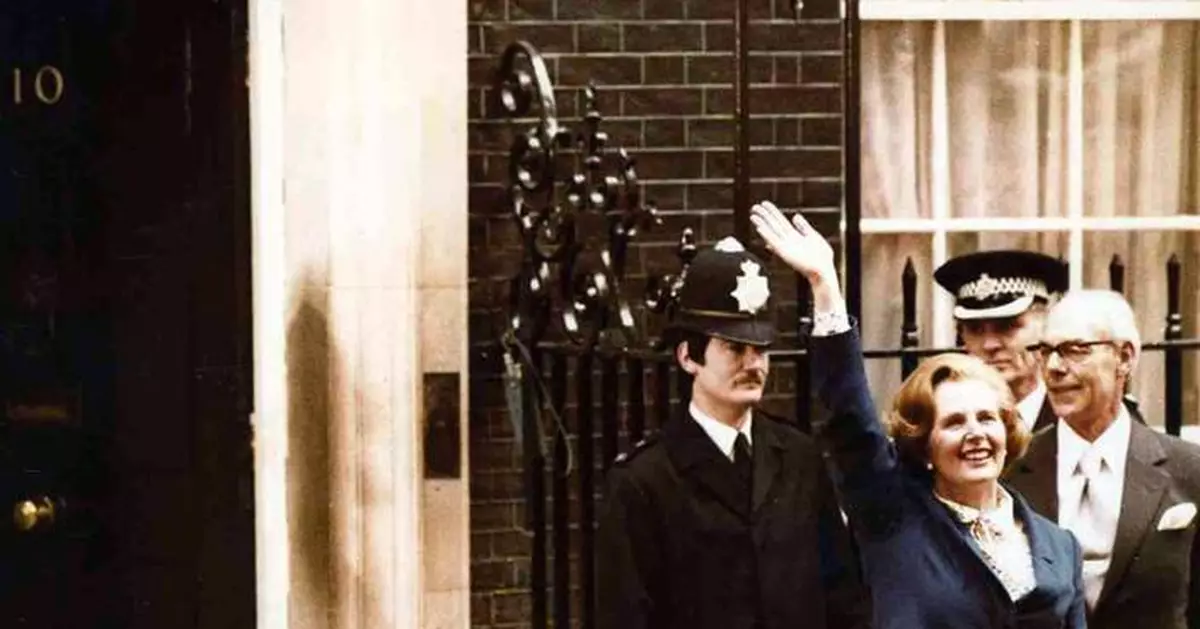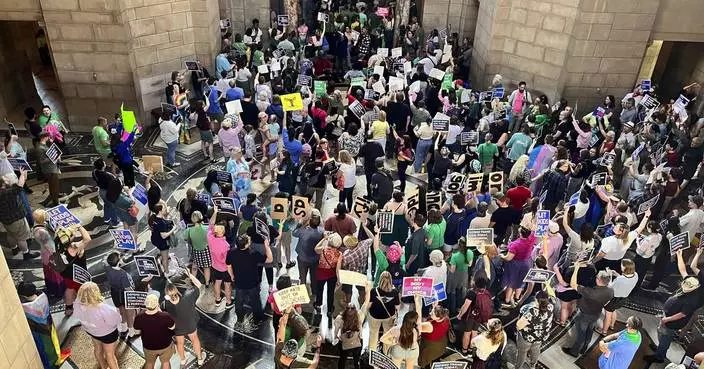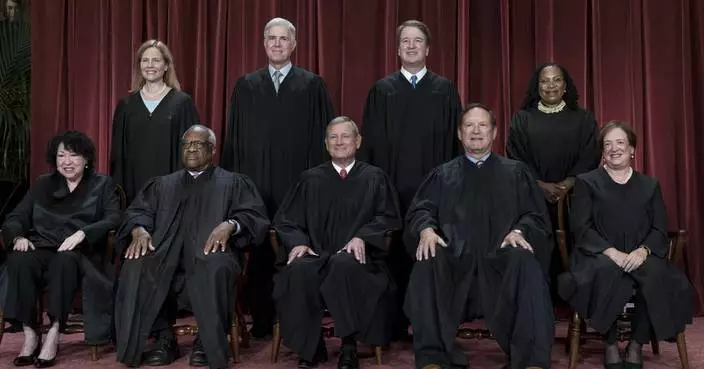LONDON (AP) — Britain’s upcoming general election is widely expected to lead to a change of government for the first time in 14 years. Many analysts believe it will be one of the country’s most consequential elections since the end of World War II.
Ahead of the July 4 vote, The Associated Press takes a look back at other landmark U.K. elections since the war.
Click to Gallery
LONDON (AP) — Britain’s upcoming general election is widely expected to lead to a change of government for the first time in 14 years. Many analysts believe it will be one of the country’s most consequential elections since the end of World War II.
FILE - British Prime Minister Margaret Thatcher meets with US President Ronald Reagan at the White House in Washington, Feb. 20, 1985. Britain’s upcoming general election on July 4, 2024, is widely expected to lead to a change of government for the first time in 14 years. Britain's general election in 1979 is without doubt the most consequential since 1945, with Margaret Thatcher becoming the country’s first female prime minister on a radical Conservative economic agenda. At its heart, Thatcherism represented a total rethink over the role of the state. (AP Photo/J. Scott Applewhite, File)
FILE - Britain's Conservative party leader Margaret Thatcher raises her arm and points, while answering questions at a press conference in London, April 11, 1979, launching her party's policies for the General Election. Britain’s upcoming general election on July 4, 2024, is widely expected to lead to a change of government for the first time in 14 years. Britain's general election in 1979 is without doubt the most consequential since 1945, with Margaret Thatcher becoming the country’s first female prime minister on a radical Conservative economic agenda. At its heart, Thatcherism represented a total rethink over the role of the state. (AP Photo/Lawrence Harris, File)
FILE - Britain's Conservative Party Leader Margaret Thatcher with her husband Dennis gives a jubilant wave at her party headquarters on election night in London, May 4, 1979. Britain’s upcoming general election on July 4, 2024, is widely expected to lead to a change of government for the first time in 14 years. Britain's general election in 1979 is without doubt the most consequential since 1945, with Margaret Thatcher becoming the country’s first female prime minister on a radical Conservative economic agenda. At its heart, Thatcherism represented a total rethink over the role of the state. (AP Photo/Bob Dear, File)
FILE - Britain's Conservative Party leader Margaret Thatcher waves to wellwishers as she arrives at 10 Downing Street, London with her husband Denis at right, May 4, 1979. Britain’s upcoming general election on July 4, 2024, is widely expected to lead to a change of government for the first time in 14 years. Britain's general election in 1979 is without doubt the most consequential since 1945, with Margaret Thatcher becoming the country’s first female prime minister on a radical Conservative economic agenda. At its heart, Thatcherism represented a total rethink over the role of the state. (AP Photo/Bob Dear, File)
——
Britain's general election in 1979 is without doubt the most significant since 1945, with Margaret Thatcher becoming the country’s first female prime minister on a radical Conservative economic agenda.
At its heart, Thatcherism represented a total rethink over the role of the state.
Since Labour's big victory in 1945, a so-called postwar consensus on the economy existed between the two main parties, Labour and the Conservatives. Despite the changes in power, their economic approaches aligned. Governments targeted full employment and would intervene in the economy to pursue that goal through tax and spending policies.
That consensus was getting increasingly frayed through the 1970s as Britain went into an economic tailspin, with inflation running at postwar highs and trade unions increasingly militant in pursuit of their pay claims.
The May 1979 election took place in the wake of the so-called Winter of Discontent, a huge wave of strikes across industries and public services. The mood within the Labour government, led by Jim Callaghan, was downbeat.
Thatcher, who sought to play up to her image as the Iron Lady, said things couldn't carry on as they were. She won a sizeable majority in the election and stayed in power for more than 11 years, a period which saw income taxes slashed, particularly on the wealthy, and the privatization of many industries such as energy and telecommunications.
On the international stage, Thatcher enjoyed a close relationship with her political soulmate, U.S. President Ronald Reagan. Both talked tough on the Soviet Union. She also grew increasingly vocal in her opposition to what was then called the European Economic Community, now the European Union, which ultimately led to her downfall.
Thatcher's premiership, which lasted until she was effectively ousted by members of her own party in 1990, is one of the most controversial in postwar Britain.
Her admirers include current Prime Minister Rishi Sunak and many other senior Conservatives who cite Thatcher as their political inspiration. But to her opponents, Thatcher was a divisive figure whose free-market economic liberalism wrecked local communities and whose growing euroskepticism fueled opposition to European integration that ultimately led to the Brexit vote in 2016.
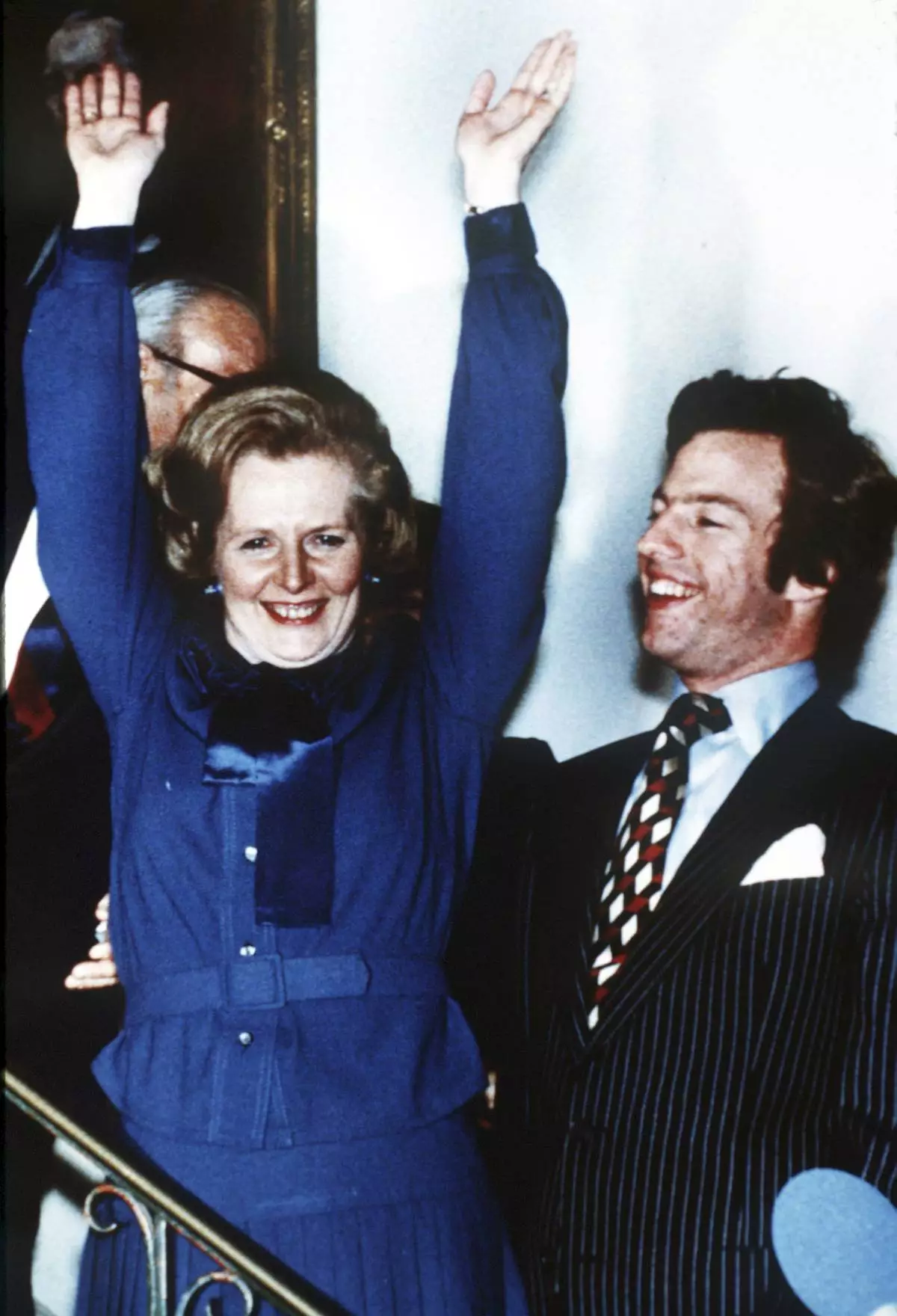
FILE - Britain's Margaret Thatcher waves in celebration at Conservative Party headquarters in London in the early hours of May 4, 1979, after winning the General Election. At right is her son Mark. Britain’s upcoming general election on July 4, 2024, is widely expected to lead to a change of government for the first time in 14 years. Britain's general election in 1979 is without doubt the most consequential since 1945, with Margaret Thatcher becoming the country’s first female prime minister on a radical Conservative economic agenda. At its heart, Thatcherism represented a total rethink over the role of the state. (AP Photo/Bob Dear, File)
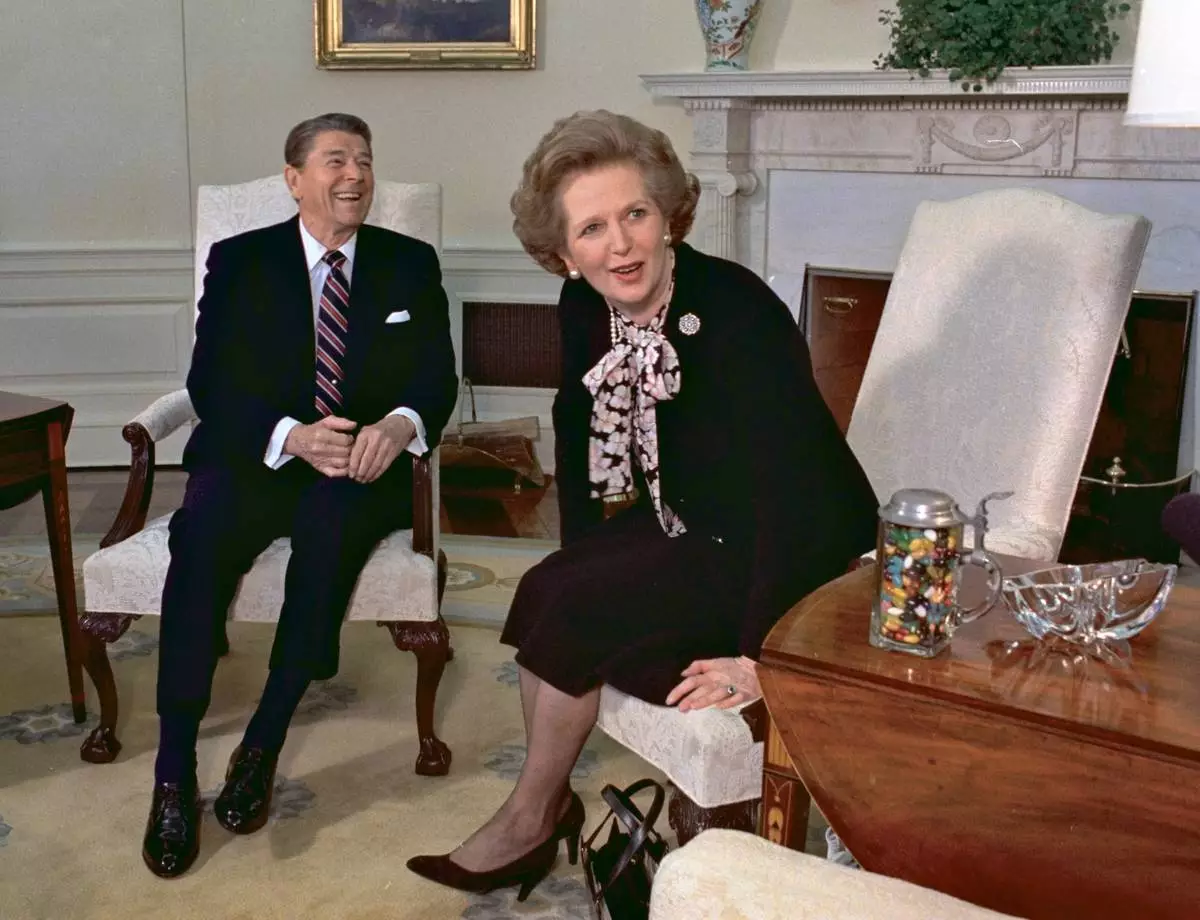
FILE - British Prime Minister Margaret Thatcher meets with US President Ronald Reagan at the White House in Washington, Feb. 20, 1985. Britain’s upcoming general election on July 4, 2024, is widely expected to lead to a change of government for the first time in 14 years. Britain's general election in 1979 is without doubt the most consequential since 1945, with Margaret Thatcher becoming the country’s first female prime minister on a radical Conservative economic agenda. At its heart, Thatcherism represented a total rethink over the role of the state. (AP Photo/J. Scott Applewhite, File)
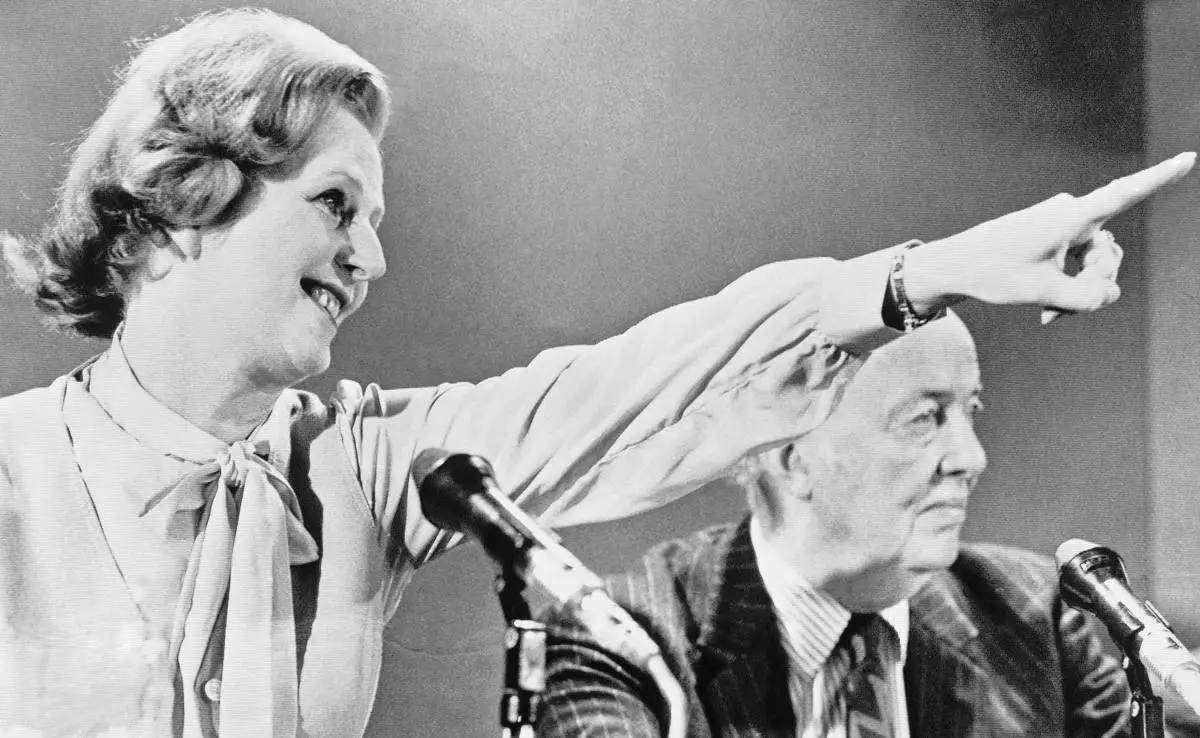
FILE - Britain's Conservative party leader Margaret Thatcher raises her arm and points, while answering questions at a press conference in London, April 11, 1979, launching her party's policies for the General Election. Britain’s upcoming general election on July 4, 2024, is widely expected to lead to a change of government for the first time in 14 years. Britain's general election in 1979 is without doubt the most consequential since 1945, with Margaret Thatcher becoming the country’s first female prime minister on a radical Conservative economic agenda. At its heart, Thatcherism represented a total rethink over the role of the state. (AP Photo/Lawrence Harris, File)
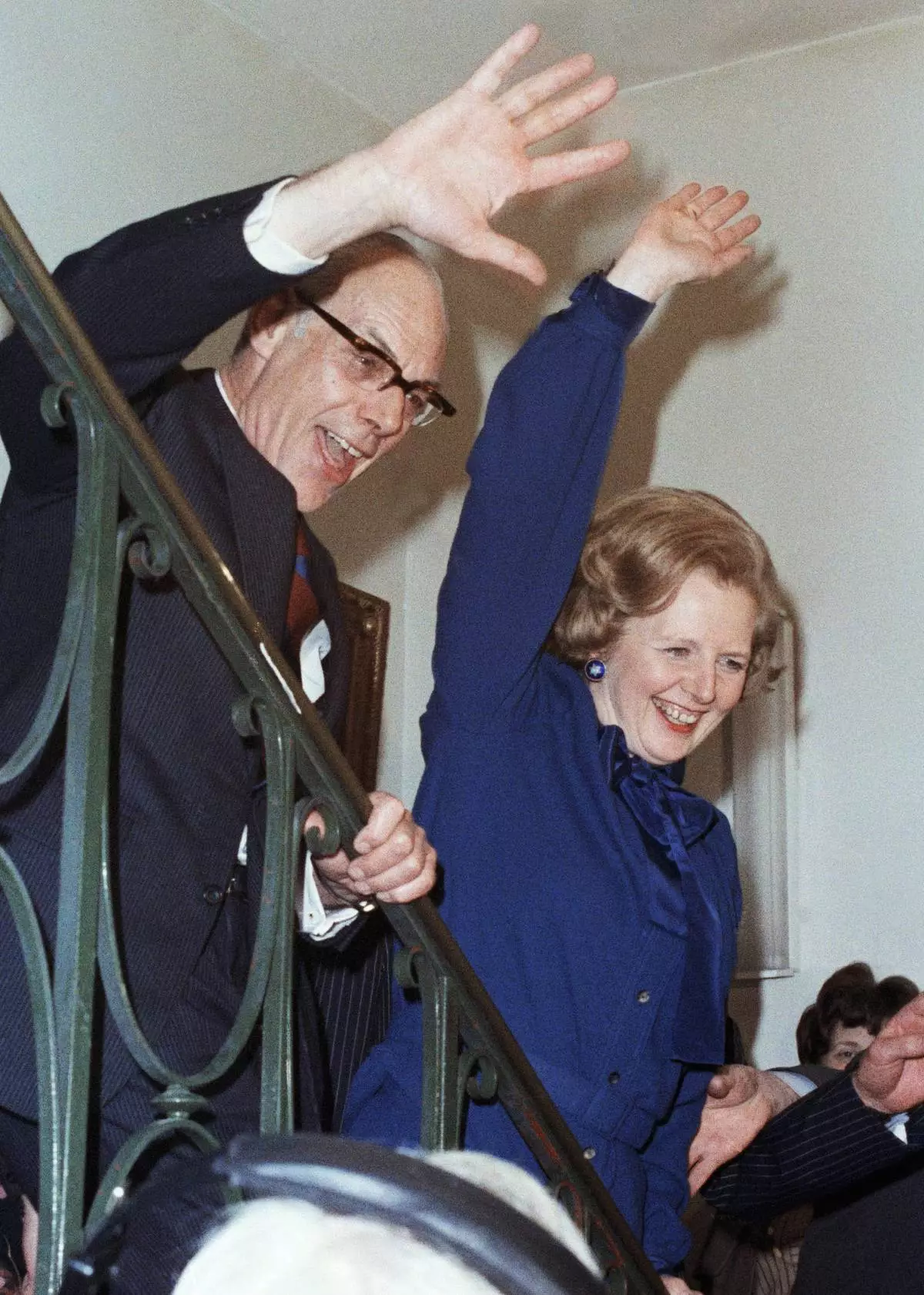
FILE - Britain's Conservative Party Leader Margaret Thatcher with her husband Dennis gives a jubilant wave at her party headquarters on election night in London, May 4, 1979. Britain’s upcoming general election on July 4, 2024, is widely expected to lead to a change of government for the first time in 14 years. Britain's general election in 1979 is without doubt the most consequential since 1945, with Margaret Thatcher becoming the country’s first female prime minister on a radical Conservative economic agenda. At its heart, Thatcherism represented a total rethink over the role of the state. (AP Photo/Bob Dear, File)
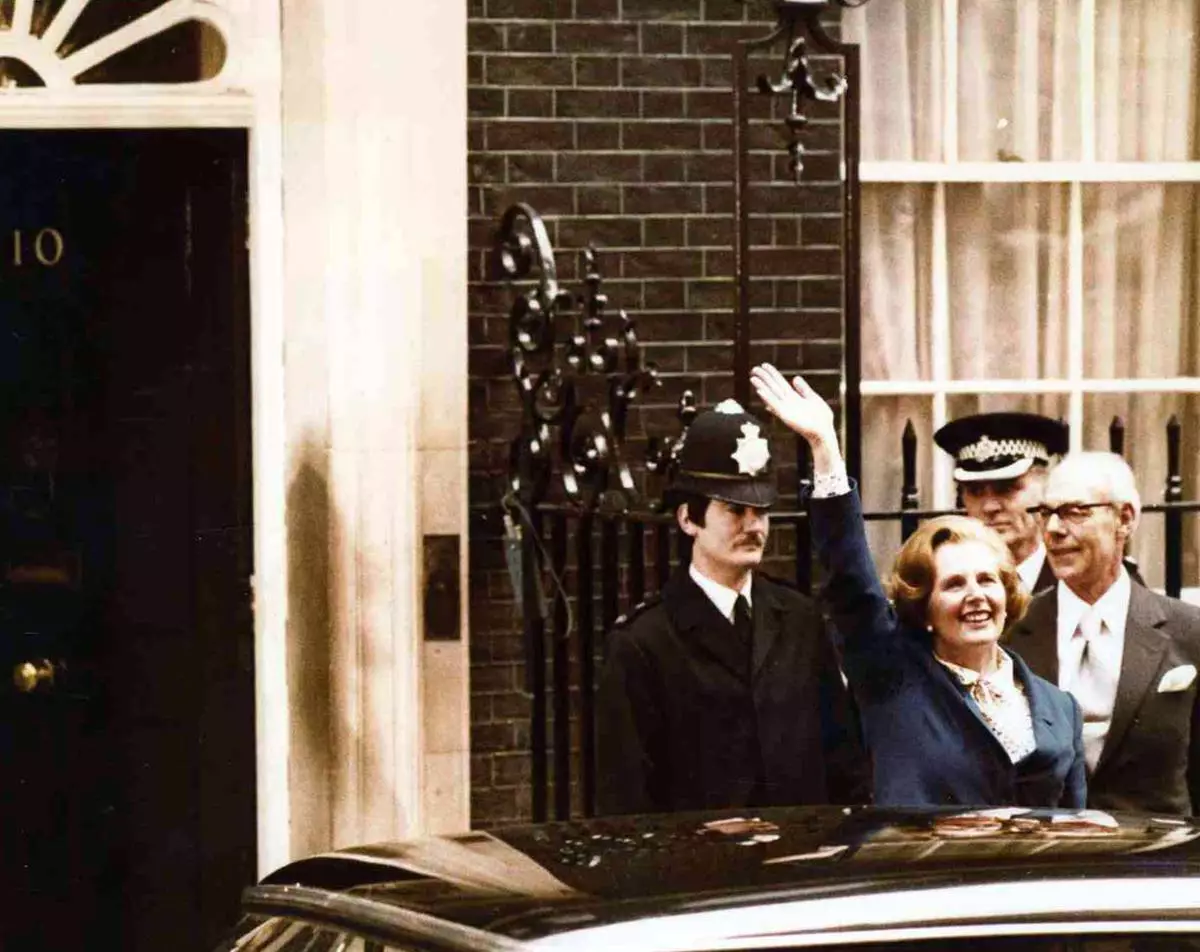
FILE - Britain's Conservative Party leader Margaret Thatcher waves to wellwishers as she arrives at 10 Downing Street, London with her husband Denis at right, May 4, 1979. Britain’s upcoming general election on July 4, 2024, is widely expected to lead to a change of government for the first time in 14 years. Britain's general election in 1979 is without doubt the most consequential since 1945, with Margaret Thatcher becoming the country’s first female prime minister on a radical Conservative economic agenda. At its heart, Thatcherism represented a total rethink over the role of the state. (AP Photo/Bob Dear, File)
TIRANA, Albania (AP) — Albanian novelist and poet Ismail Kadare, whose irreverent works from inside communist Albania earned him international renown and repression from the country's dictatorship, has died in Tirana, his publishing editor said Monday. He was 88.
Kadare won a number of international awards, and had long been mentioned as a possible contender for the Nobel Prize in literature.
Albanian President Bajram Begaj praised Kadare as the country's “spiritual emancipator.”
“Albania and Albanians lost their genius of letters ... the Balkans (lost) the poet of its myths, Europe and the world (lost) one of the most renowned representatives of modern literature,” Begaj said in a statement released by his office.
Albania's government declared two days of national mourning on Tuesday and Wednesday, when flags will fly at half-staff. A minute's silence will be observed nationwide Wednesday following Kadare's funeral.
Onufri Publishing House editor Bujar Hudhri said the author died Monday morning after being rushed to a hospital.
A nurse at the hospital said he was taken to the emergency room after suffering cardiac arrest. She spoke on condition of anonymity because she was not authorized to talk to the media.
Kadare became internationally recognized after his novel “The General of the Dead Army” — which later inspired a film starring Marcello Mastroianni and Anouk Aimee — was published in 1963. The book told the story of an Italian general who was sent to Albania to find and repatriate the bones of thousands of his compatriots killed there during World War II, and who dwells on the futility of the task and of war.
At the time, Albania was still governed by the communist government of late dictator Enver Hoxha that had turned the small, mountainous Balkan country into Europe's most isolated.
Celebrated for the delicate writing of his novels, Kadare fled to France in the fall of 1990, just a few months before the collapse of the communist regime following student protests in December. He lived in Paris and had recently returned to Tirana, the Albanian capital.
During a visit to Albania last year, French President Emmanuel Macron awarded him the Grand Officer of the Legion of Honor title. France had previously also made him a foreign associate of the Academy of Moral and Political Sciences, as well as Commander of the Legion of Honor.
Kadare was awarded a number of international prizes, including the inaugural International Booker Prize in 2005. His works, which included more than 80 novels, plays, screenplays, poetry, essays and story collections, were translated into 45 languages.
Born on Jan. 28, 1936, in the southern Albanian city of Gjirokaster, Kadare graduated from Tirana University's History and Philology Faculty and went on to study at Moscow's Maxim Gorky Literature Institute.
But he was recalled after Hoxha split with the Soviet Union — the first of two great ruptures with major communist powers that was later to conclude with China.
Back in Albania, Kadare won a reputation as a poet and novelist, but soon fell foul of the communist regime, which banned several of his works and briefly exiled him to the provinces.
“The General of the Dead Army” attracted major international attention when it was translated into French and published in the West. This recognition abroad has been credited with shielding Kadare from the more violent retribution Albania's communists routinely reserved for dissidents.
After the fall of communism in Albania, Kadare resisted calls from different political parties or politicians to become the country’s president.
He is survived by his wife, Helena, also a writer, and his daughters Gresa and Besiana.
The funeral will be held on Wednesday.
Semini reported from Bari, Italy.

FILE - Albanian novelist Ismail Kadare arrives at the Elysee Palace to receive the France's Legion d'Honneur medal by French President Francois Hollande, in Paris, on May 30, 2016. Renowned Albanian novelist Kadare has died after being rushed to a hospital in the Albanian capital, his publishing editor said on Monday. He was 88. (AP Photo/Thibault Camus, File)







